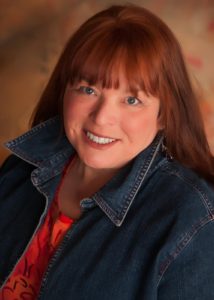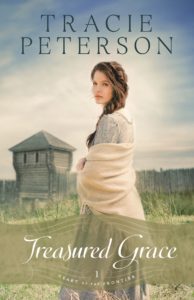Can you share a little about your recent book –
My last book is titled TREASURED GRACE and it’s book 1 in the Heart of the Frontier series. The series is set in 1847 and goes through 1856. The location is the Oregon Territory and book one deals with the Whitman Mission massacre. It’s a romance set against tragic events that helped to mold the governments’ attitude toward Native Americans.
Why do you write? Do you have a theme, message, or goal for your books?
Writing for me is a ministry. I want to share the Gospel of Jesus Christ in each book, but give it in a way that isn’t just hitting people upside the head with a Biblical 2×4. I also include Bible application and encouragement for the believer. I want each of the books to do what I call my 3E’s. I want them to entertain, educate and encourage.
How long have you been writing? And how long did it take you to get your first major book contract?
I had tried off and on to publish since I was a teen. I got my first contract in November of 1992. You have to remember, however, that I wanted to write Historical Christian romance and there wasn’t a market for it prior to that. I was even told at one point, “Christians don’t have romances.” Since then, most publishing houses agree that Christians do have romances and have tried their hand at publishing stories about that. Now I write primarily Christian Historical Romantic Intrigue and was recently introduced as the Queen of Christian Historicals. I thought that after 110 books, most of which were historical, the title was a good fit.
How long does it take you to write a book?
I dedicate 3-4 months for each book’s writing. However, I’m doing research well in advance of writing and I’m plotting out story ideas prior to that. I also write up a detailed synopsis as a road map for each book which allows me to write super fast and then have lots of time for editing.
What’s your writing work schedule like?
Normally I write each day. I strive for a chapter a day and when I sit down to write it, I go over the chapter I wrote the day before to get me into the flow of writing the next chapter. I write the first draft fast and furiously and then spend a good amount of time in editing. When my writing for the day is done – sometimes this takes a couple of hours and sometime it takes a lot more – then I do research work for future projects, look for events and locations I’d like to write about, answer fan mail and so forth.
Do you have an interesting writing quirk? If so, what is it?
I don’t know if it’s a quirk or not, but I’m a stickler for two things. I want accuracy in my writing and reading materials. I research as much as possible for each book because nothing ruins a book faster for me than historical inaccuracy. I am also a stickler for a detailed chapter by chapter synopsis which I know seat-of-the-pants writers would consider a negative quirk. J
The detailed synopsis saves me from ever having much in the way of rewrites, however, so I’ll stick with it. Some writers worry that this takes out the spontaneity of the story, but it doesn’t. I use it as a guideline only. If I need to make changes or add characters or subplots, I do. It’s just that with the detailed synopsis I can write something even when I don’t feel overly creative.
What has been your greatest joy(s) in your writing career?
Seeing lives transformed by the stories God has given to me to write.
What has been your darkest moment(s)?
Hmmm, that’s a tough one. I can’t think of any real dark writing moments. I suppose the thing that bothers me most is seeing authors caught up in the contests and best-seller’s lists and being depressed when their books don’t get there. Satan uses the world’s judging standards to make authors feel like winners and losers, and it has ruined many a great author. I remember an author coming to me once after her book didn’t win in a contest. She told me she was giving up writing because apparently, she didn’t have what it took to win. That’s a dark moment.
Which of your books is your favorite?
That’s really impossible to say – kind of like “which kid is your favorite”. I can honestly say they’ve all been favorites for one reason or another. Generally, however, the book I’m writing at the time is my favorite just because it’s uppermost in my mind.
Who is your favorite author to read?
Again, there are a great many. I love Charles Martin, Liz Curtis Higgs, Jen Turano, Judith Miller, Kimberley Woodhouse, Cathy Marie Hake and Elizabeth Camden just to name a few. There are also quite a few secular authors I regularly read.
What advice can you give aspiring writers that you wished you had gotten, or that you wished you would have listened too?
Over the years, I got a lot of really good advice, but one question came to me from a little workshop I attended when I was first getting started. It was so simple, but so important. This was the question: Why are you writing? It’s critical to know why you write. If you are writing for money, then it will send you in a different direction than if you’re writing as a ministry. If you’re writing as a ministry, then that will send you in a different direction than someone who is writing to make the New York Times best-seller list for the fame of it or to make their mom proud or to prove something to someone who put them down. Everyone has a reason they write and what it is they’re trying to accomplish. However, what I wish every writer would do is write for the pure joy of storytelling. I know that I would write, even if I never published another book. I love writing and storytelling and therefore whether a book sells one copy or a hundred thousand, I enjoy what I do. Knowing why I write takes a huge pressure off.
How many times in your career have you experienced rejection? How did they shape you?
I had a lot of rejection letters in the early years of pursuing publication. Some were form letters and others were given with kind comments. Those rejections made me try harder. If advice was given, I heeded it and went in search of learning.
Do you have a favorite character or scene in one of your books?
Not really.
Where do you get your ideas?
They come from all around me. I truly believe that my storytelling ability is a gift from God and I know that He gives me ideas by sending things into my life. Some come from Bible studies, some from non-fiction reading and often from travel, but always I know God is at the very core of it.
What are common mistakes you see aspiring writer’s make?
Some of the biggest problems I see with new author work today is that they haven’t bothered to do their research. I’m known for my detailed research and accuracy is important. It doesn’t mean I won’t make mistakes and readers are ever so happy to let me know when I do, but I try to be accurate. I’ve read books lately that were so bad where research was concerned. Even silly details like a book saying that Denver sat surrounded by mountains. (It doesn’t – they’re on the western side only). Or an author having a gelding horse give birth or describe a bay horse as having a pale blond coat. These are easy things to research and if an author is unwilling to do their work in those areas, then I can’t trust them to have done it in other areas more critical to the story. Writers need to remember the reader develops a trust with them and keeping that trust is important.
I see a lot of head hopping with new authors – where they are in one character’s point of view and in the next paragraph they’re in another’s and back and forth. It’s impossible to get into deep pov-which is preferred by most publishers without sticking to one pov at a time. You can separate points of view by chapter breaks or space breaks within a chapter, but don’t bounce back and forth in the same paragraph.
Probably the other really big mistake I see is refusing to take correction. I’ve been the managing editor of a line and can’t tell you the number of times new authors would argue with me about something I pointed out or ask them to change. For example, I had one woman who had written a story based on something her grandmother had told her. The situation, however, was well-documented and didn’t happen that way at all. I ask the writer to make changes because I liked the general story, but she refused because her grandmother’s word was Gospel to her. Another time I pointed out the head-hoping to an author and ask them to rewrite to one pov at a time. She refused and said it ruined her story. The publisher, however, had a hard fast rule about this and I couldn’t buy the story even though I loved her work. Yet another time I asked an author to verify and offer proof of details she’d put in her book and she wouldn’t or couldn’t and told me she shouldn’t have to.
Writers, especially newbies, but all writers need to respect the authority of the publishing house. It doesn’t mean you can stand up for your work, but you need to handle things in a respectful manner. I’ve had publishers challenge details before. I remember once, early in my career, I had written into a story the location of the train depot in Washington D.C. At that time it was at an intersection of two streets, however those streets no longer intersect. My editor called me on it and I produced the map to show her that in 1840 those streets did intersect. It’s important to be able to show proof to defend your writing with something more than “grandma’s word”, but it’s also important to realize that your editor is only trying to make your book the best it can be.
Writers do not publish a book alone. The writing is just one aspect of the book. There are so many people who will play a role in your book from editors, proofers and typesetters, to artists and design experts, to marketing and distribution people, to bookstore owners and the readers themselves. Without any one of those people, your book suffers.
Where/How do you recommend writers try to break into the market?
I think the best thing writers can do is attend conferences where editors and agents will be present to take one-on-one appointments. Most publishing houses are requiring agents now, but even if they don’t, they like to use agented material. The publishers rarely ever look at anything that comes in without first being requested so it’s important to at least get their attention at a conference. Sometimes it also saves the writer a great deal of trouble by sending their work to a publisher or agent who doesn’t deal in that type of writing. There are a lot of really good conferences out there and often, even if there aren’t a lot of editors or agents attending, a writer can team up with other authors who might be able to get their work into the hands of an agent for consideration.
Ultimately, it’s up to the writer to be the best they can be and that includes being well-informed. Join a local or national chapter of writers. You can learn so much this way. I helped to found American Christian Fiction Writers and know that this organization has helped to get many an author published. They offer great workshops online and at conferences, as well as net-working, critique groups, industry news, etc. They’re just one of many writer groups out there.
Last of all, I encourage all writers to keep writing. Your genre may not be popular right now, but I’ve seen various genres rise and fall over the years. Chasing the market by writing what you think the market is looking for can be a deadly trap. I’ve seen authors try this and instead of writing what they know and are really good at, they try to emulate other authors and fail. Often this has ended their career. So write what you love and have a deep passion for writing. It shows in your work and will definitely be noticeable to the editor.
Tracie Peterson is the best-selling, award winning author of over 110 books. Her work in historical romance garnered her the Best Western Romance Author of 2013 by True West Magazine. She was given the Life Time Achievement Award from American Christian Fiction Writers in 2011 and the Career Achievement Award in 2007 from Romantic Times, as well as multiple best book awards.
Tracie has been married to Jim for over 37 years and enjoys working with him on historical research for each of her books. They make their home in the mountains of Montana. They have three grown children and three grandchildren. They also have an adopted family in Africa that has given them another seven grandchildren – two of whom were named for Tracie and Jim.
The most important thing about writing for Tracie is – this is her ministry. It is her deepest desire is to share the Gospel with a dying world and to bring glory to God in her work. She works with each storyline to include the message of salvation and Biblical application for daily obstacles. Throughout her career she has been blessed to see how God has used the books for His glory to change lives. Tracie works to make each book meet her required 3 E’s. The books need to Entertain, Educate and Encourage – all to the glory of God.
Summing up what she does, Tracie said, “I get to do something I dearly love – tell stories, travel to meet wonderful and interesting people and see new places, work with my husband and serve God, all while being paid. Who could ask for anything more?”
Website: www.traciepeterson.com
Amazon: https://www.amazon.com/Tracie-Peterson/e/B001I9W8WK/ref=sr_ntt_srch_lnk_4?qid=1486467248&sr=1-4








1 Comment
Tracie, Thank you for sharing your life with us. I’m blessed that you write to declare Christ.